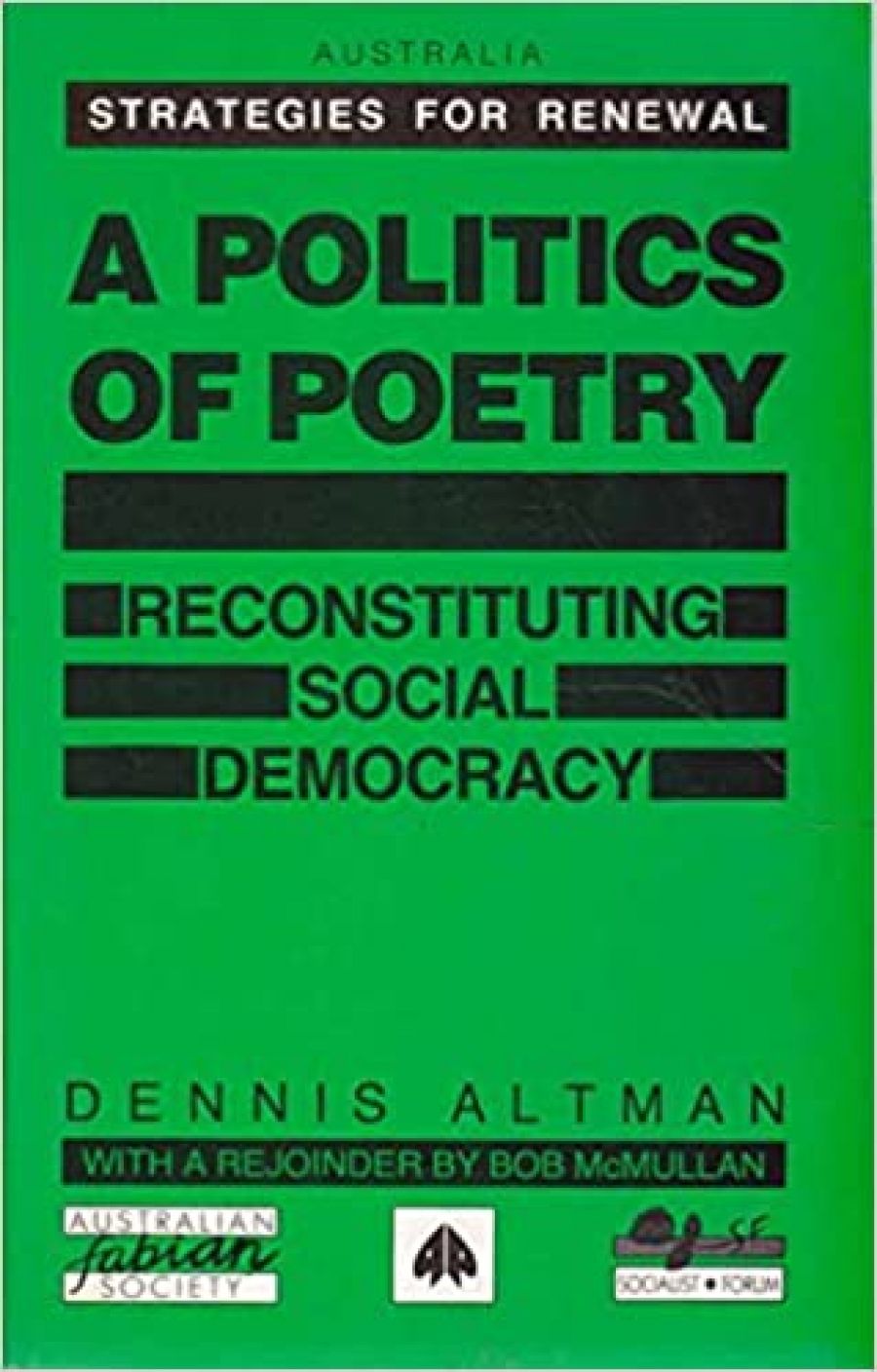
- Free Article: No
- Contents Category: Society
- Review Article: Yes
- Custom Highlight Text:
The cover story of the first issue of The Australian’s new coloured magazine was of five people who had made a million dollars in their twenties. These young people’s achievements were presented for us to admire and to envy. Nowhere in the interviews with them was it suggested that people might be motivated by different values from the ones that drive these lives.
- Book 1 Title: A Politics of Poetry
- Book 1 Subtitle: Reconstituting social democracy
- Book 1 Biblio: Pluto Press, 72 pp, $6.95 pb
Many on the left are dispirited by the political environment in which they must now work. The political climate seems against them and appeals to altruism seem hopelessly old-fashioned in today's consumerist wonderland. They will stay old-fashioned, too, argues Dennis Altman in his booklet A Politics of Poetry: Reconstituting social democracy, unless they are reworked for the changed circumstances of today.
His booklet is the second in a series, called ‘Strategies for Renewal’, which is published by Pluto Press, the Australian Fabian Society and Socialist Forum. The series aims ‘to promote constructive debate of the major social, economic, and industrial issues confronting Australia’ and arises from the conviction of many on the left that hard intellectual work is needed if its vision of a more just and equitable society is not to fade into irrelevance.
Altman argues that the social democratic vision is still relevant in Australia today but that it cannot be the same as the visions of the past. Circumstances have changed, and the left has to rethink both its values and its strategies. In particular, Altman argues, it has to fight the right over the meaning of individual freedom.
Individualism is central both to the values of liberalism and to the values of the market. Liberal values like freedom of speech and, more recently, of sexual choice, are deeply held by many on the left. And they are deeply held within the culture. There is now a widespread expectation of the possibilities of personal choice and self-expression in the private areas of life. Although such values are consonant with a consumerist society, which invites people to express their individuality through the way they spend money, they are still important values. Recognising this, the left must continue to argue for the value of cooperative solutions to social problems, and to stress the interdependence of people. The right’s beliefs that economic freedoms are the primary freedoms, and that a hidden hand will take care of the common good, must be defeated.
Altman points out a comforting lesson the left can learn from the right. Although much of the time the right presents people as driven only by material or economic goals, much of their political strength, particularly in America, comes from people’s commitment to non-economic goals – to religious and moral values. Altman argues that contemporary politics divides along two axes: according to the priority that is attached to material as against nonmaterial values; and according to the traditional conflict between left and right over economic issues. These cleavages create problems for both parties in Australia. The Labor party is vulnerable to the split between the non-materialist left (e.g. environmentalists) and its traditional working-class constituency which looks to the party to protect its living standards. But the Liberal Party is similarly vulnerable as the current conflict over immigration show.
Despite the economic rationalists, ideals and values continue to move people; politics is as much about symbols and emotions as it is about the hip pocket nerve. The task of the left, then, Altman argues, is to put poetry into politics, to create a new dream, a new vision of a society which is socially just and egalitarian, in which people recognise their mutual dependences yet are tolerant of difference, and in which we recognise our interdependence with the environment. (He develops this last point less than I would have liked.)
Altman writes well, with a fluid, easy style, always addressing a general politically interested audience. There’s plenty here to think, talk and argue about. It’s to be hoped this book will help draw some of the dispirited left back into politics, filled with new hope about contemporary political possibilities and new determination to realise them.
The booklet also contains a rejoinder by senator Bob McMullan, formerly National Secretary of the Federal ALP, outlining some ways the ALP might respond to Altman' s arguments. There’s not much poetry here, and there’s a lot of talk about the constraints that will be faced by future Labour governments., but there is a cautious embracing of ideas about the importance of idealism and political mobilisation, and an interesting argument for the reform of the party branch structure away from geographically based branches to branches based on special interests and issues. It is just such a shift of the experience of community from class and location-based experience to communities centred around individually chosen commitments that Altman argues the left needs to mobilise.


Comments powered by CComment